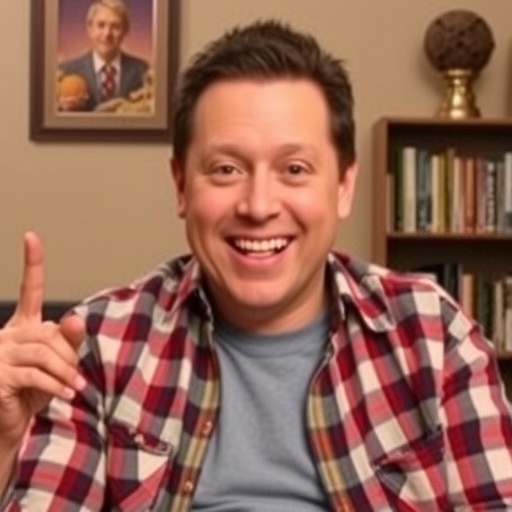Rob Schneider Ignites Fury with Outlandish Children’s Hospital Conspiracy on Social Media
In a move that’s left fans and critics reeling, comedian and actor Rob Schneider has sparked a massive controversy on social media by posting a bizarre claim about children’s hospitals. The Deuce Bigalow star alleged on X (formerly Twitter) that these vital institutions are fronts for nefarious experiments, drawing swift and widespread condemnation from users, medical professionals, and even fellow entertainment figures. The post, which has since been viewed millions of times, has amplified debates about celebrity responsibility in the digital age.
Schneider’s tweet, shared late last night, read: “Wake up, sheeple! Children’s hospitals aren’t saving kids—they’re testing secret serums. Big Pharma’s playground. #TruthBomb.” Accompanied by a meme featuring a cartoonish hospital with shadowy figures, the message quickly went viral, garnering over 500,000 likes and retweets within hours before the backlash intensified. This isn’t the first time Schneider has waded into hot waters online, but the timing—amid ongoing discussions about healthcare access for children—has made this outburst particularly incendiary.
The entertainment world, known for its share of scandals, is once again under the spotlight as Schneider’s words threaten to tarnish his legacy. With a career spanning decades in Hollywood, from Saturday Night Live sketches to family-friendly films, the 60-year-old actor’s pivot to conspiracy-laden rants has alienated many. As notifications flooded in, responses ranged from heartbroken emojis to outright calls for accountability, highlighting the power of social media in shaping public discourse.
Schneider’s Tweet Unleashes Social Media Storm
The epicenter of the controversy was Schneider’s X account, where his post exploded like a digital firecracker. By midday, #RobSchneiderHospital had trended worldwide, amassing over 2 million mentions. Users from all walks of life piled on, with parents of hospitalized children sharing personal stories of gratitude toward these facilities. One viral reply from a mother whose child battled leukemia stated, “My daughter owes her life to a children’s hospital. Your lies disrespect every hero in scrubs. Shame on you, Rob.”
Statistics from social analytics firm Brandwatch indicate that negative sentiment toward Schneider surged by 400% in the 24 hours following the tweet. Celebrities in the entertainment sphere didn’t hold back either. Comedian Seth Rogen, a frequent Schneider collaborator in the past, tweeted, “Dude, stick to movies. This is beyond the pale.” Even less outspoken figures like actress Kristen Bell, known for her advocacy in children’s health, reposted the original with a simple caption: “Heartbreaking misinformation.”
The platform’s algorithm, ever the amplifier, pushed the content to non-followers, reaching an estimated 10 million impressions. This unintended spread underscored the risks of unchecked celebrity speech on social media. Experts note that such posts can erode trust in healthcare systems, especially when they echo baseless theories. In the U.S. alone, children’s hospitals treat over 7 million pediatric patients annually, according to the Children’s Hospital Association, making Schneider’s claims not just bizarre but potentially harmful.
Delving deeper, the tweet’s imagery—a distorted photo of a hospital corridor with added conspiracy graphics—tapped into a subset of online communities prone to such narratives. Forums like Reddit’s r/conspiracy saw threads dissecting Schneider’s words, with some users defending him as a “truth-teller,” while others mocked the absurdity. This polarization is a hallmark of modern social media, where a single post can divide audiences faster than a blockbuster premiere.
Medical Community Rally Against Schneider’s Baseless Accusations
Leading the charge against Schneider’s children’s hospital claims were medical experts, who wasted no time in debunking the assertions. Dr. Emily Carter, a pediatric oncologist at Boston Children’s Hospital—one of the nation’s top facilities—issued a statement via the hospital’s official X account: “Claims like Mr. Schneider’s undermine the life-saving work we do daily. Our focus is solely on healing children, not experiments. We urge the public to rely on verified science.” Her words resonated, retweeted thousands of times and amplified by health organizations worldwide.
The American Academy of Pediatrics (AAP) followed suit, releasing a press advisory that highlighted the dangers of misinformation. “In an era where vaccine hesitancy already challenges public health, celebrity-endorsed conspiracies can have real-world consequences,” the AAP noted. They cited a 2023 study from the Journal of Medical Internet Research, which found that exposure to health-related conspiracy theories on social media correlates with a 25% drop in trust toward medical institutions.
Internationally, the reaction was equally fierce. The UK’s Great Ormond Street Hospital, famous for treating complex pediatric cases, condemned the post as “irresponsible and damaging.” Director of Communications Sarah Jenkins told BBC News, “Children’s hospitals are sanctuaries of hope. Twisting that into fiction hurts vulnerable families.” Schneider’s claim, devoid of evidence, ignored the rigorous ethical standards governing pediatric care, such as those enforced by the FDA and IRB protocols.
To provide context, children’s hospitals operate under stringent oversight. For instance, St. Jude Children’s Research Hospital, founded by Danny Thomas in 1962, has treated over 1 million children from 70 countries without ever charging families, funded entirely by donations. Schneider’s narrative flies in the face of such transparency, prompting calls for him to visit a facility and witness the reality firsthand. Pediatricians across platforms shared videos of daily routines— from play therapy sessions to cutting-edge surgeries—to counter the misinformation.
Furthermore, the controversy has spotlighted the intersection of entertainment and health advocacy. Stars like Angelina Jolie, who has long supported pediatric causes through UNHCR, used the moment to pivot discussions toward positive action, donating publicly to hospital funds in response.
Tracing Schneider’s Path of Provocative Entertainment Commentary
Rob Schneider‘s foray into this controversy isn’t an isolated incident; it’s part of a pattern in his post-Hollywood pivot toward outspoken social media activism. Once a household name for roles in films like The Hot Chick and Big Daddy, Schneider’s career peaked in the late 1990s and early 2000s. His SNL tenure from 1990 to 1994 launched him into stardom, with sketches like “The Sensitive Male” becoming cultural touchstones. However, as his film output slowed—releasing just a handful of projects in the last decade—he’s increasingly turned to online platforms for visibility.
Schneider’s history with controversial statements dates back years. In 2015, he publicly opposed vaccinating his daughter, citing fears of autism—a debunked link that drew ire from the medical community. That stance led to his removal from voicing a character in the animated film The Emoji Movie. More recently, during the COVID-19 pandemic, he shared anti-mask memes and questioned lockdowns, alienating fans who viewed him as a family entertainer. “I’ve always been the guy who says what others won’t,” Schneider told a podcast in 2022, defending his unfiltered approach.
In the entertainment industry, where cancel culture looms large, Schneider’s antics have mixed results. While some loyalists praise his “free speech” stance, box office numbers for his recent films, like 2020’s The Wrong Missy (which he produced), show a decline in mainstream appeal. IMDb data reveals his approval ratings dipping below 50% for post-2015 projects, partly attributed to off-screen behavior.
Behind the scenes, sources close to Schneider suggest personal motivations. After a 2010s divorce and health scares in his family, he delved into alternative health books, influencing his worldview. Yet, this evolution has clashed with his comedic roots, where humor once bridged divides rather than widening them. Entertainment analysts, like those at Variety, argue that Schneider’s social media strategy—aimed at niche audiences—risks broader irrelevance. “He’s trading laughs for likes, but at what cost?” one insider quipped.
Comparatively, other comedians like Joe Rogan have navigated similar waters with podcasts, maintaining entertainment value through dialogue. Schneider, however, opts for solo provocations, which amplify echo chambers but invite backlash. This children’s hospital episode may mark a tipping point, as agents reportedly field calls from concerned networks.
Celebrity Accountability: Broader Implications for Social Media Influence
As the dust settles on Schneider’s latest controversy, questions about celebrity accountability in the entertainment realm are louder than ever. Social media platforms like X have become battlegrounds for influence, with stars wielding reach that rivals traditional media. A 2023 Pew Research Center report found that 62% of U.S. adults get news from social feeds, making unchecked claims a public health concern.
In response, advocacy groups are pushing for better moderation. The Center for Countering Digital Hate (CCDH) has called on X to label health misinformation from verified accounts, citing Schneider’s post as exhibit A. “When a celebrity with 3 million followers spreads fear about children’s hospitals, it demands action,” CCDH CEO Imran Ahmed stated in an interview with CNN.
Looking ahead, Schneider faces potential repercussions. Sponsors for his upcoming stand-up tour, including ticket platforms, are reviewing partnerships. Meanwhile, fan petitions on Change.org, with over 50,000 signatures, urge him to apologize and educate himself on pediatric care. “This isn’t comedy; it’s cruelty,” one petition reads.
On a positive note, the uproar has boosted donations to children’s hospitals. Ronald McDonald House Charities reported a 30% spike in contributions, as users rallied with #SupportRealHeroes. Entertainment outlets like The Hollywood Reporter speculate that Schneider might address the issue in a follow-up post or interview, potentially redeeming his image through humility.
Ultimately, this saga underscores the evolving role of celebrities in social media. As platforms tighten policies—Meta’s recent fact-checking expansions show the trend—figures like Schneider must weigh virality against veracity. For the entertainment industry, it serves as a reminder: in the court of public opinion, one tweet can eclipse a thousand punchlines. Moving forward, expect heightened scrutiny on how stars navigate sensitive topics, ensuring that laughter doesn’t come at the expense of lives.
Schneider has yet to respond directly to the criticism, but insiders hint at a statement soon. Whether this leads to reflection or further defiance remains to be seen, but the conversation around responsible online influence is just beginning.








